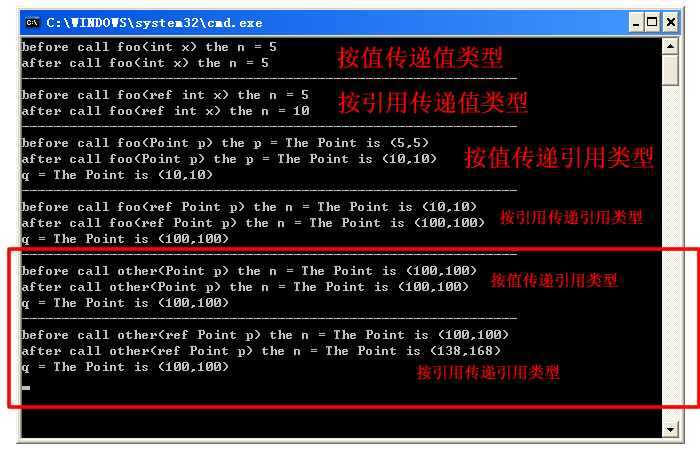原地址:http://www.cnblogs.com/DonLiang/archive/2008/02/16/1070717.html
近段時間,有幾個剛剛開始學習C#語言的愛好者問我:C#中的函數,其參數的傳遞,按值傳遞和按引用傳遞有什么區別。針對這一問題,我簡單寫了個示例程序,用以講解,希望我沒有把他們繞暈。因為,常聽別人說起:“你不說我還明白,你一說,我就糊涂了”。
好,現在開始吧。
我們知道,在C#中,類型有值類型(例如int)和引用類型(例如string)之分,傳遞參數有按值傳遞和按引用傳遞之分。這樣,簡單的組合一下,我們可以得到以下幾種傳遞方式:(1)按值傳遞值類型。(2)按值傳遞引用類型。(3)按引用傳遞值類型。(4)按引用傳遞引用類型。一般來說,除非使用特定的關鍵字(ref和out)否則參數是按值傳遞的。也就是說,會傳遞一個副本。傳遞副本的一個好處是,可以避免誤操作而影響了原始值。原因是在被調用的函數體內,操作的是副本的值,而不是原始值。當然,傳遞副本也是有副作用的,最為突出的應該是由于復制而產生的性能損耗,這點在大型的值類型身上尤為突出。那么C#的編譯器的默認行為為什么不是使用按引用傳遞參數呢?呵呵,其實我沒仔細深入思考過這個問題。我猜測,是因為安全因素吧,就是怕函數誤操作了原始值。這點應該和C#的編譯器要求顯示使用關鍵字(ref和out)差不多,都是為了清楚地表達使用的意圖,以避免誤操作。使用ref等關鍵字,暗示函數調用者知道,在函數體內,也許存在修改原始值的語句,會改變參數的值(或者叫狀態)。
用個簡單的示例演示一下。
示例代碼如下所示:
 using System;
using System;

 namespace DonLiang
namespace DonLiang


 {
{
 class Sample
class Sample


 {
{

 public static void foo(int x)
public static void foo(int x)


 {
{
 x = 10;
x = 10;
 }
}

 //*
//*
 public static void foo(ref int x)
public static void foo(ref int x)


 {
{
 x = 10;
x = 10;
 }
}
 //*/
//*/


 /**//**//**//*
/**//**//**//*
 public static void foo(out int x)
public static void foo(out int x)
 22 {
22 {
 23 x = 10;
23 x = 10;
 24 }
24 }
 25 //*/
25 //*/



 public class Point
public class Point


 {
{
 private int m_x;
private int m_x;
 private int m_y;
private int m_y;

 public Point()
public Point()


 {
{
 m_x = 0;
m_x = 0;
 m_y = 0;
m_y = 0;
 }
}

 public Point(int x, int y)
public Point(int x, int y)


 {
{
 m_x = x;
m_x = x;
 m_y = y;
m_y = y;
 }
}

 public void Change(int x, int y)
public void Change(int x, int y)


 {
{
 m_x = x;
m_x = x;
 m_y = y;
m_y = y;
 }
}

 public override string ToString()
public override string ToString()


 {
{
 return string.Format("The Point is ({0},{1})", m_x.ToString(), m_y.ToString());
return string.Format("The Point is ({0},{1})", m_x.ToString(), m_y.ToString());
 }
}
 }
}



 public static void foo(Point p)
public static void foo(Point p)


 {
{
 p.Change(10, 10);
p.Change(10, 10);
 }
}

 public static void foo(ref Point p)
public static void foo(ref Point p)


 {
{
 p.Change(100, 100);
p.Change(100, 100);
 }
}

 public static void other(Point p)
public static void other(Point p)


 {
{
 Point tmp = new Point(13, 16);
Point tmp = new Point(13, 16);
 p = tmp;
p = tmp;
 }
}

 public static void other(ref Point p)
public static void other(ref Point p)


 {
{
 Point tmp = new Point(138, 168);
Point tmp = new Point(138, 168);
 p = tmp;
p = tmp;
 }
}



 static void Main(string[] args)
static void Main(string[] args)


 {
{
 int n = 5;
int n = 5;

 //call the foo(int x) method and check what happened.
//call the foo(int x) method and check what happened.
 Console.WriteLine("before call foo(int x) the n = " + n.ToString());
Console.WriteLine("before call foo(int x) the n = " + n.ToString());
 foo(n);
foo(n);
 Console.WriteLine("after call foo(int x) the n = " + n.ToString());
Console.WriteLine("after call foo(int x) the n = " + n.ToString());

 Console.WriteLine("--------------------------------------------------------------");
Console.WriteLine("--------------------------------------------------------------");

 //call the foo(ref int x) method and check what happened.
//call the foo(ref int x) method and check what happened.
 Console.WriteLine("before call foo(ref int x) the n = " + n.ToString());
Console.WriteLine("before call foo(ref int x) the n = " + n.ToString());
 foo(ref n);
foo(ref n);
 //foo(out n);
//foo(out n);
 Console.WriteLine("after call foo(ref int x) the n = " + n.ToString());
Console.WriteLine("after call foo(ref int x) the n = " + n.ToString());
 Console.WriteLine("--------------------------------------------------------------");
Console.WriteLine("--------------------------------------------------------------");
 Point p = new Point(5, 5);
Point p = new Point(5, 5);
 Point q = p;
Point q = p;

 //call the foo(Point p) method and check what happened.
//call the foo(Point p) method and check what happened.
 Console.WriteLine("before call foo(Point p) the p = " + p.ToString());
Console.WriteLine("before call foo(Point p) the p = " + p.ToString());
 foo(p);
foo(p);
 Console.WriteLine("after call foo(Point p) the p = " + p.ToString());
Console.WriteLine("after call foo(Point p) the p = " + p.ToString());
 Console.WriteLine("q = " + q.ToString());
Console.WriteLine("q = " + q.ToString());

 Console.WriteLine("--------------------------------------------------------------");
Console.WriteLine("--------------------------------------------------------------");

 //call the foo(ref Point p) method and check what happened.
//call the foo(ref Point p) method and check what happened.
 Console.WriteLine("before call foo(ref Point p) the n = " + p.ToString());
Console.WriteLine("before call foo(ref Point p) the n = " + p.ToString());
 foo(ref p);
foo(ref p);
 Console.WriteLine("after call foo(ref Point p) the n = " + p.ToString());
Console.WriteLine("after call foo(ref Point p) the n = " + p.ToString());
 Console.WriteLine("q = " + q.ToString());
Console.WriteLine("q = " + q.ToString());

 Console.WriteLine("--------------------------------------------------------------");
Console.WriteLine("--------------------------------------------------------------");

 //call the other(Point p) method and check what happened.
//call the other(Point p) method and check what happened.
 Console.WriteLine("before call other(Point p) the n = " + p.ToString());
Console.WriteLine("before call other(Point p) the n = " + p.ToString());
 other(p);
other(p);
 Console.WriteLine("after call other(Point p) the n = " + p.ToString());
Console.WriteLine("after call other(Point p) the n = " + p.ToString());
 Console.WriteLine("q = " + q.ToString());
Console.WriteLine("q = " + q.ToString());

 Console.WriteLine("--------------------------------------------------------------");
Console.WriteLine("--------------------------------------------------------------");

 //call the other(ref Point p) method and check what happened.
//call the other(ref Point p) method and check what happened.
 Console.WriteLine("before call other(ref Point p) the n = " + p.ToString());
Console.WriteLine("before call other(ref Point p) the n = " + p.ToString());
 other(ref p);
other(ref p);
 Console.WriteLine("after call other(ref Point p) the n = " + p.ToString());
Console.WriteLine("after call other(ref Point p) the n = " + p.ToString());
 Console.WriteLine("q = " + q.ToString());
Console.WriteLine("q = " + q.ToString());

 Console.ReadLine();
Console.ReadLine();
 }
}

 }
}
 }
}
按值傳遞引用類型 和 按引用傳遞引用類型
之所以把這兩個放在一起講,是因為,如結果圖所示,兩種傳遞方式,都成功修改了值——這兩個函數都分別調用了一個輔助修改的函數Change,去修改內部狀態,即m_x,m_y的值,從5到10。呃,竟然都可以成功修改原始值,那么,為什么會存在兩種方式呢?它們有什么區別嗎?分別用在什么地方?為了說明他們的區別,我特意寫了兩個名為other的函數,在函數內new一個Point對象,并使從參數傳遞過來的引用這個新生成的Point對象。值得提醒的是,這個引用其定義在函數體外。其運行如上圖我用方框框起來那個。
可以很清楚地看到,通過值傳遞方式,可以改變其值,卻不能改變其本身所引用的對象;而按引用傳遞方式可以。
順便提一下,代碼中,有一段注釋掉的代碼,使用out關鍵字的。當你嘗試將其兩者一起寫著,然后,編譯,C#編譯器是會提示錯誤的(
error CS0663: 'foo' cannot define overloaded methods that differ only on ref and out)。其原因是,C#編譯器,對ref和out生成的IL代碼,是相同的;而在CLR層面,是沒有ref和out的區別的。C#中,ref和out的區別,主要是,誰負責初始化這個參數使之能用——ref形式是函數外初始化,而out是函數內初始化。